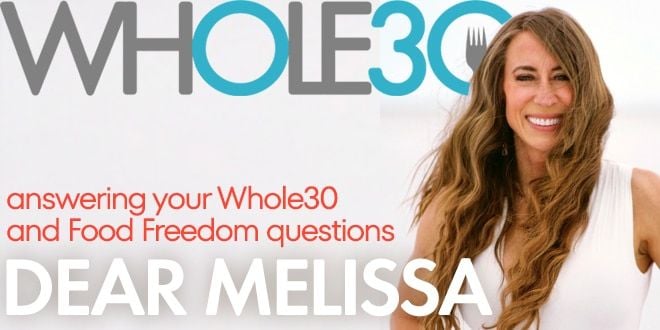Welcome to Dear Melissa, where I answer your questions about the Whole30 and Food Freedom. Today, we’re talking about a serious subject: whether the Whole30 is appropriate for those recovering from or still navigating an eating disorder.
Dear Melissa,
I had multiple eating disorders for more than 20 years. I recovered for over two years, then many challenges came about late last year and I relapsed. I’m eager to get back into a healthy way of eating and a healthy state of mind. When I first recovered I was eating a paleo-style diet, and I felt amazing. Whole30 includes most of the foods I was eating when I felt my best, discourages tracking of calories or food, and doesn’t restrict calories. Plus the program offers so much support. I’ve read stories about how the Whole30 helped people recover from their ED. Is it safe for me to do a Whole30? -Danielle, Houston, TX
Dear Danielle,
We take this question very seriously. In my opinion, eating disorders are so much harder to overcome than a drug or alcohol addiction. We (addicts) can just stop using drugs entirely—in fact, that’s our prescription. Just don’t use. Ever. Not even once. Not at all. But everyone eats. I can’t imagine how much harder it would have been to moderate my drug intake, versus exorcising it from my life altogether.
I admire your dedication in pursuing a healthy relationship with food, and do believe that eating real, nutrient-dense, unprocessed foods is the healthiest way to nourish your body and break unhealthy cravings and habits. Some people with eating disorders (active or in recovery) have found amazing food freedom with the Whole30. The fact that we don’t count or restrict calories, encourage you to eat healthy foods to satiety, and take the scale and body measurements out of the equation may prove to be the paradigm shift that you need to get back to a healthier relationship with food.
Here are a few testimonials:
“I have had trouble in the past with an eating disorder, and any diet scares me. I don’t want to become obsessed with the way I am eating like I was before. I had less trouble with the Whole30 than I have had before. I didn’t focus on food every second of the day; I didn’t start to hate myself more as pounds dropped away. For the first time, I was able to remain rational about my body while following a food plan. That really might be the biggest benefit I have gotten from the Whole30.” Kelly E., Marietta, GA
“I’ve been on several ends of the disordered eating scale, and I tell you that for the first time, I do not want to eat between meals, and I am already barely thinking about food. If you don’t know what that’s like, it’s hard to explain it, but the relief is unimaginable. This is not Weight Watchers. This is living.” -ScoutFinch, on the Whole9 website
“I was addicted to sugar. I was even seeing a counselor for compulsive overeating. The Whole30 broke my sugar addiction and changed my life!” Sara A., Holmen, WI
“I was fat for most of my life. I used to binge eat, and lost a lot of weight by discontinuing that behavior, but I always felt like I was on the edge of a precipice, and could fall back anytime. Doing the Whole30 makes me feel in control in a way that being obsessive never did.” Jane C., Washington, DC
“I have gained a sense of peace when it comes to food. I no longer label foods as ‘good’ and ‘bad.’ I have lost the guilt and stress I sometimes felt about food. I have a much healthier relationship with it. It has been the final piece in my recovery puzzle. I used to be a strict calorie counter, and I don’t feel the need to do that anymore. I gauge my eating on how my body feels, and what I need to give it to fuel my activities and nourish it. I had ignored my body’s signals for many years. Through the Whole 30 I re-learned how to listen to my body, paying attention to giving it what it needs to thrive.” Andrea, Dallas, TX
However, I believe these testimonials are the exceptions. I believe most people with a history of eating disorders discover that the rigidity and restriction of the Whole30 program are triggering for their disorders. For these people, the Whole30 “as prescribed” can actually provoke disordered eating behaviors, hurting their relationship with food and their bodies more than it helps. The restrictions may carry over to calorie or macronutrient restriction in anorectics, or may trigger a binge in those with a history of compulsively overeating (or both).
Psychiatrist Dr. Emily Deans weighs in
We asked Dr. Emily Deans, a psychiatrist and clinical instructor at Harvard Medical School, to help us answer this question from her experience working with patients recovering from an eating disorder:
“A program like the Whole30 can have mixed results in people with an eating disorder. On one hand, there are many positives: focusing on food for nourishment rather than for reward or punishment. No calorie counting, no scales, no semi-starvation daily blood sugar roller coaster.
Many of my eating disordered patients will eat very restricted diets of low-fat and low-carb processed foods so there is strict control over portion size and calories. By switching over to whole foods and healthy carbohydrates and fats, you can be liberated from the yoke of calories and fat grams and experience a much more diverse range of nutritious foods. I’ve spoken to people who switched to a no processed foods-style diet and found their eating disorders to go into remission, because they lost the cravings and love/hate relationship with their bodies and what they put in it.
On the other hand, a Whole30 is another kind of restriction (of certain foods rather than calories), and for some people, it can lead to intense cravings to binge and reactivate some dormant eating disordered behavior.
A way of eating that keeps you healthy, provides all the nutrition you need, and overall helps you think less about food and body image is likely the healthiest diet for you, but it’s very important to know yourself before you embark on one of these programs. If you have a history of a serious eating disorder, I wouldn’t do major dietary change without knowing you have a trusted counselor in your corner.”
Is the Whole30 right for someone with a history of eating disorders?
Our official position is that the Whole30 is contra-indicated for those with a history of disordered eating. There are other programs and approaches specifically designed by healthcare professionals that are likely better suited for your recovery, with far fewer risk factors than the Whole30
If this is your context and you still wish to explore the Whole30, we first encourage you to discuss the program with your eating disorder counselor, therapist, or qualified healthcare provider.
It is imperative that you and your therapist have a plan before you embark upon a program like the Whole30—what you’ll do if you start feeling triggered, how you might modify the plan to obtain most of the benefits while staying mentally healthy, and what you should do next if you have to drop the program altogether.
In addition, while we generally recommend the Whole30 be completed exactly as written, we didn’t create the program with eating disorders in mind. If your therapist believes the program could be health-promoting for you but wants to adjust the rules, duration, or structure of the program to make it less rigid, by all means do so. Your doctor or therapist’s recommendations always take priority.
I hope that this perspective and Dr. Dean’s advice on the Whole30 and eating disorders will help you and your healthcare provider make the decisions that are right for you. I wish you the best in your recovery.
Melissa
Got a question for Melissa? Submit it using this handy form.
Remember, we aren’t answering questions about the Whole30 rules via this column (use the forum!), nor are we able to offer you specific advice about your medical issue, health condition, or body composition.















